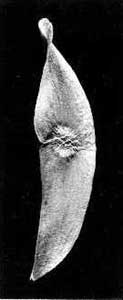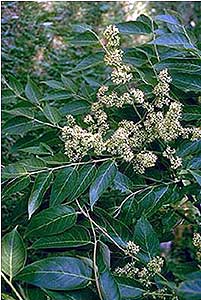Noxious Weeds to Watch--Ailanthus
“Tree of Heaven” sounds wonderful doesn’t it? Well, names can be deceiving. That’s the case with Ailanthus altissima, Tree-of-Heaven, which also is known as “Chinese Sumac”. Many residents of Trinity County may not be acquainted with this tree, or be aware of the problems it presents in some areas of the county. Tree of Heaven often is confused with Black Walnut, sumacs, and other trees. That’s because they all have similar leaves, which are compound leaves made up of leaflets arranged on a central stem called a rachis. Ailanthus can get 30 to 60 feet tall and has smooth gray bark. Flowers occur at the ends of branches and produce a distinctive, offensive odor described as “burnt peanut butter”.
This fast-growing tree was introduced to California during the Gold Rush, possibly by Chinese miners, and was used in urban areas, because of its tolerance to a wide range of conditions.
In its native land, China, the wood is used in construction and furniture making. Its’ leaves are used as fodder for goats and sheep; and its bark juice and gum resins are used medicinally. Its flowers are used in creating fragrances and dyes. In California; however, Tree-of-Heaven is a noxious and highly invasive, non-native species. The Trinity County Weed Management Cooperative Group has included this tree in its list of species to be targeted for control, because of the many problems that it poses. It can overwhelm native plants, forming dense thickets by producing prolific numbers of sprouts from its roots and through its ability to reproduce from seeds – one tree can generate up to 350,000 seeds per year. On top of that, Tree-of-Heaven releases chemicals into the soil that inhibit the growth and survival of other plants. The toxin is so effective that it is being tested for use as an herbicide. It has a very well developed taproot that gets established within three months. Its roots may undermine foundations and roadways.
This species, like many of the noxious and invasive species that we deal with in Trinity County, is a tough plant that can colonize locations that have been disturbed such as recent construction sites and the edges of roadways. Most concentrations of Tree of Heaven in Trinity County are found along roads, like Highway 299 in the Junction City to Big Flat area, and around old mining sites and Chinese settlement areas.
 |
Tree of Heaven (Ailanthus Altissima) seed.
|
 |
Ailanthus in flower.
|
|


